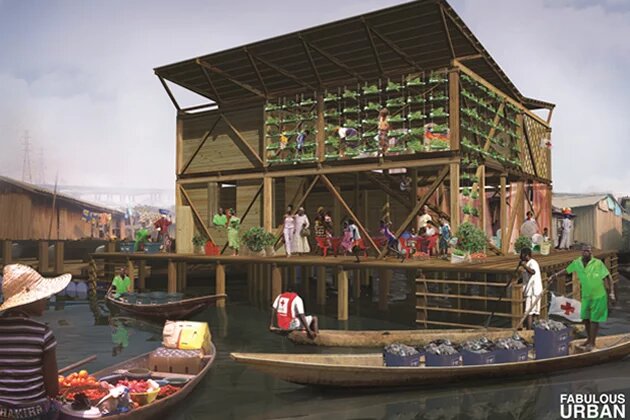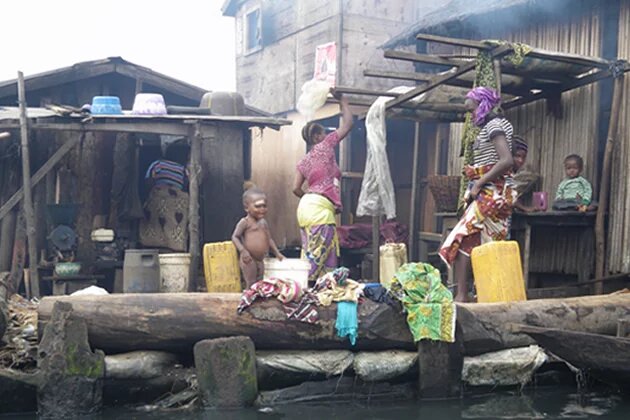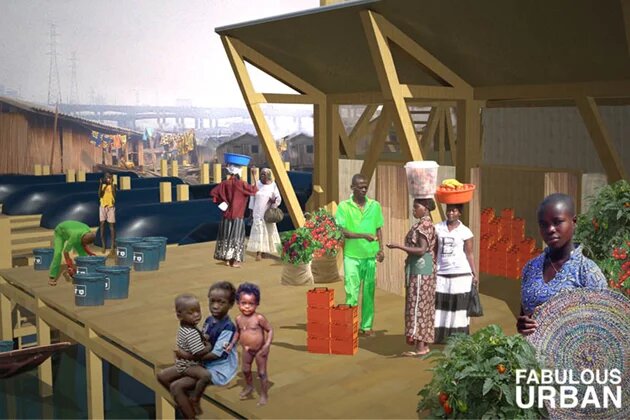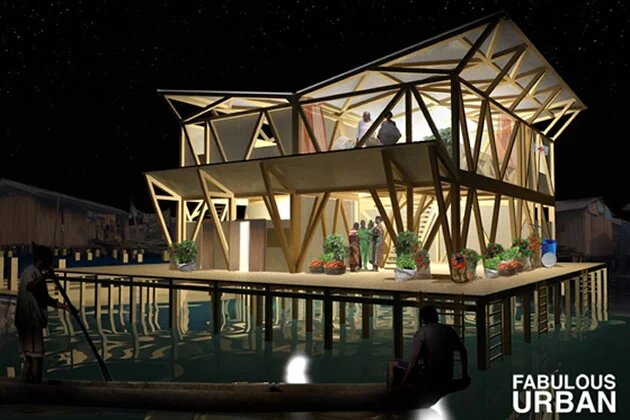

How Vulnerability and Fragility can turn into Strength:
Lagos is located at sea level, and that itself presents some challenges. Globally it is expected that general sea level will rise by over one mm a year until 2100. This global phenomenon may locally be reinforced by the fact that developed and wealthy regions usually have more sealed surface, which will increase the storm water runoff. This is likely to be the case with Lagos which has started to work on controversial land reclamation projects, both in the lagoon and at the seashore. All these activities may additionally raise the local water level and lead to extended seasonal flooding. One of the important questions is therefore how one can prevent floods. The answer is most probably that there is no way to prevent floods. When confronted with water, a powerful nature force, one has basically only one choice: Learn to live with the water; learn to live with the flood; learn to live with the given climate condition
This leads to the question of how to achieve a more attractive, liveable city that is economically competitive, and where its settlements are not damaged regularly by flooding. This is particularly pertinent for Lagos which has to deal with the existence of the large informal space production and its result—slums2, shantytowns, low-income areas. Roughly two-third of the Nigerian and Lagosian population lives in slums, informal settlements or low-income areas. Lagos has so far not developed a comprehensive slum-upgrading approach. Successful models in this respect have been implemented in Brazil and some of its largest cities over the last years and decades. Cities like São Paulo and Rio de Janeiro are comparable to Lagos in terms of population size and dynamic growth and may serve as role models for Lagos—not only because slums are being upgraded but mainly because the slum dwellers become the official owners of their houses and have tenancy for the land.
An example for such an informal settlement in Lagos is Makoko. Large parts of the Makoko settlement are in the lagoon, well visible from the Third Mainland Bridge, one of Lagos' major traffic arteries. The Makoko people build their wooden houses on stilts. There are different academic controversies and interpretations whether this tradition is an ancient one, going back to the 19th century, or whether it is rather a new phenomenon, only a few decades old. However, considering the natural condition of the Lagos region, characterized by two lagoon arms, several larger and smaller streams, connecting to the hinterland, swamps and mangrove vegetation—this form to settle in the shallow lagoon, the stilt architecture seems to come naturally. The people settling in the lagoon, no matter what the driving force behind it seem to have found a particularly unaggressive way of living in coexistence with the water.
The other side of the coin, the lack of sanitation, which afflicts women in particular; the lack of land tenure security; the extreme poverty; the fact that many people have high debts incurred in order to be able to run their micro-businesses, which are often not profitable, and the related insufficient income situation (roughly half of the Makoko people lives below the official poverty line, on less than 1.25 US$ per day), results in the endless recycling of poverty The fact that people have no income or lack of reliable, stable income sources, is therefore by far the greatest problem that needs to be addressed.
The pioneering, alternative, yet precarious Makoko way of living was the departing point of a project proposal. As part of the working group of the Makoko/ Iwaya Waterfront Regeneration Plan, elaborated and submitted to Lagos State Ministry of Physical Planning and Urban Development in 2013, the proposal looked at how vulnerability and fragility can be turned into strength,. Combining the existing local knowledge and wisdom with a new resource-based local economy for and by the locals, based on the specific spatial and social conditions can provide answers to the challenges ahead. Climate change—this is the current assumption—will lead to increased flooding and even new permanently flooded grounds. This describes exactly the Makoko condition. Therefore, Makoko is not a problem; it offers a solution. The "Makoko system" possesses a great capability to adapt to climate change and its expected consequences, the increased presence of water in our life. Pragmatically and inventively, the people of Makoko have found ways to deal with permanent flooded grounds—a reality that may increasingly become the norm in many other peoples' life. The strength and specificity of the Makoko way lies in the robust, almost autarkic way of construction and lifestyle that should be reinforced and upgraded with an appropriate and therefore adaptable infrastructure system—which is flexible, low-cost and independent enough to function throughout the year. Hence, it can teach us something, even on a global level.
It has the potential to become a worldwide showcase. This can be achieved if the many lacks – for instance reliable, stable income sources, any kind of infrastructure whatsoever (waste management, sanitation, energy etc.) – can be turned into micro-entrepreneurial opportunities while still relying on the local intelligence in how to deal with the water. The implementation of small, decentralized biogas plants on water, which use the locally accruing organic waste as feedstock, operated and owned by the locals create a resource-based and therefore sustainable local economy. The biogas plants, run by sun light that is abundant in Lagos' tropical and hot climate, are designed as multi-purpose public infrastructure, also providing biogas cooking, home grown food (dunged with the fertilizer from the biogas production), simple water harvesting and water filter systems, toilets and showers, and a doctor's room. The so-called neighbourhood Hotspots offer a wide range of community services and are at the same time the "brains" of the new organic waste economy. The biogas technology is low-tech, robust, simple to implement and easy to maintain, producing renewable energy with a waste-to-value philosophy and in closed loops. The organic waste, the feedstock, is locally available, and will consist of human waste, fish guts, and organic garbage from the households, plants and vegetables. The "Neighbourhood Hotspots" are shared facilities, a place to learn, a place to gather, encouraging personal initiative, personal responsibility, and entrepreneurial activities.
The suggested flexible infrastructure through the network of Neighbourhood Hotspots creates a resource-based economy, creating different job profiles, which are all coordinated by the biogas cooperative. The income of the Neighbourhood Hotspots (or the biogas cooperative) will be sufficient to pay each worker an appropriate salary and still save money in a fund for the general maintenance of the facility in order for it to be self-sustainable. The Neighbourhood Hotspots are supposed to be completed by two recycling centres on water, which deal with solid waste, mainly plastic, in cooperation with local waste management stakeholders. All the job opportunities that come with the new organic waste economy are described and visualized in so-called Opportunity Cards. All the suggested measurements are summarized in the so-called Makoko Urban Design Toolbox, which also contains construction advices, how precarious houses on the water can be stabilized, upgraded and additionally equipped with simple water harvesting systems and sanitary facilities.
Again zooming out to the Lagos metropolitan scale, Makoko—upgraded with the suggested flexible infrastructure and resource-based economy—could offer opportunities for everybody. The neighbourhood could fully sustain itself, with a waste-to-value system that uses one of the biggest problems of our days, waste, as a source for income through energy production and recycling. The combination of the existing lifestyle and the new infrastructure will not only enable the Makoko people to upgrade their neighbourhood themselves but will also contribute a possible solution in the local and global search for answers how to adapt to rising sea levels and more flooded grounds.
Big, unidirectional, and mono-functional structures, relying on centralized infrastructures and undiversified economies are extremely vulnerable. An upgraded Makoko may demonstrate ways on how how Lagos can decentralize its supply system and how it can come to grips with the tremendous and growing waste water and garbage problem; namely by empowering the neighbourhoods and local communities. Diversified and small-scale structures are sustainable and more resilient, especially in times of crises.
Last but not least, the combination of the stilt architecture and the flexible infrastructure with renewable energy sources opens the doors for an additional income source: soft and green tourism, both for the local population and international business travellers. Makoko has not only the potential to explore the possibilities of how to live with the water. It can also become a new public and green recreational area with wetlands in the heart of Lagos, showing visitors the genius loci of the metropolis.
Fish restaurants, markets, manicure and beauty shops, simple bed-and-breakfast offers, combined with boat tours, may complete the offer. Makoko could be connected through water transportation with other locations on Lagos Island, Victoria Island, and other fishing villages in the lagoon towards Badagry. An upgraded Makoko would contribute to the diverse and colourful Lagos experience, in which the Makoko people could economically and socially participate, without being evicted but with the confidence that they can contribute to a prosperous and sustainable Lagos megacity. Slum-upgrading is not only a social and human act but the economic inclusion of millions of people. People who work and earn an income, consume goods and service, pay taxes, and are able to engage in civil society. Makoko could be the starting point for a more inclusive, green, sustainable, and enjoyable Lagos.
Read more on Makoko and the Makoko/Iwaya Waterfront Regeneration Plan and contribute to the Twitter Debate #BeyondTheProject

